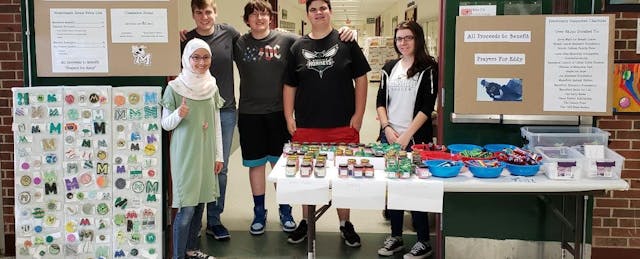Students in Jacqueline Prester’s entrepreneurship classes melt wax for candles, sew hair scrunchies and formulate hand sauce (yes, hand sauce) as part of their learning. By crafting their own products, they get essential hands-on experience learning how economic principles are relevant to their current lives, their future careers and the world around them.

Prester, a business teacher and instructional technology specialist at Mansfield High School just outside of Boston, Mass., has been pioneering authentic learning for seven years. Students run small businesses while developing essential real-world skills such as critical thinking and problem solving.
When she started teaching entrepreneurship ten years ago, Prester tried the traditional lecture-based model, but the concepts were too abstract; students weren’t connecting with the material. She decided to shake things up, taking a makerspace approach to entrepreneurship where students (she calls them makerpreneurs) learn and apply economic principles to create, market and sell handmade products.
But something was still missing.
She needed an engaging way to teach her students the necessary concepts to run their businesses. Enter Econ Essentials from CME Group and Discovery Education, a free online curriculum for high school educators and students that helps make learning core economic principles more accessible. Its modules are focused on fuel and food prices, including engaging games, quizzes, videos and other interactive components that create an authentic learning environment for students.
EdSurge chatted with Prester to learn more about how she uses interactive technology like Econ Essentials, the teaching methods required to take her entrepreneurship class from theoretical to practical and the life skills—budgeting and understanding supply and demand—her students are acquiring throughout their learning journey.
EdSurge: Can you tell me about the students in your classes?
Jacqueline Prester: My course is open to grades nine through 12 (I have three classes, each with a max of 28 students). So we have different grade levels and different ability levels. We also tend to get students who might not be college-bound. They're looking for practical skills they can use in the field right after school.
Which specific skills are you trying to teach your students?
In school, their careers and life in general, they need to understand what an economy is and how economic factors can affect them and their business. Because my students actually run small businesses in class, they need to know how to do things like figure out pricing structures and determine customer wants and needs. They look at supply and demand and create products they will actually sell. They need to decide how to sell those products, how to find a target market, how to advertise.
When all is said and done—after they've sold their products—they analyze their finances and donate the proceeds to local charities. In the seven years I’ve been running this program, we’ve donated just over $9,250 and made microloans on Kiva.org to aspiring entrepreneurs in 19 countries around the world!

It’s a very practical course on entrepreneurship with hands-on, authentic learning.
Why did you decide to add Econ Essentials to your class?
Having that interactive content is crucial, especially when something is difficult to explain and I need to give students really solid examples. Before I started using Econ Essentials in 2015, it wasn’t easy (or fun) for students to learn the concepts necessary to develop all those skills by simply talking about them.
Now, it’s much easier for them to see and understand how something like supply and demand works, for example. Because they have an interactive sliding scale they can work with at their own pace. Or they understand how world events impact gas prices and the consequences of those changes for businesses.
With Econ Essentials’ simulations and interactive activities, students can really test situations. They can take quizzes and challenges where they have to run different scenarios and try to reach a goal, such as predicting the price of gasoline so they can set ticket prices for a shuttle service. They can try over and over again until they're satisfied with where they've gotten or how much they've earned.
And that interactive content helps them when they're making decisions later on about everything from how to set the price of their hand creme to how they’ll source the fabric for hair scrunchies. They haven't just read about it; they've actually seen how scenarios can play out.
Do you think there's value to the business community in offering this kind of real-world learning opportunity to students?
Absolutely. This gives students practice being an entrepreneur. It gives them the opportunity to learn about how businesses run and a taste for working with accounting documents, creating a marketing plan, working in sales.
It gives them a taste for all of those different business functions. And if you're going to be an entrepreneur, you need to at least know what those different roles are going to entail.
Do you have any favorite success stories of students that have gone through your classes?
I’ve had a lot of students who didn’t know they were interested in business and had never thought of it as a career until my class. They ended up loving it and applying to business school. One student started his own photography business outside of school and still does it on the side today even though he’s an engineer.
Stories like that always make me happy.
But what’s most important is, because this course is so hands-on and interactive, every student learns how to work together and how to run a business. This course gives them confidence to know they can be an entrepreneur. They've done it already as a 14 or 15-year-old freshman, so every one of these students knows they can do it again later on in life. They all have the potential to be a success story.




